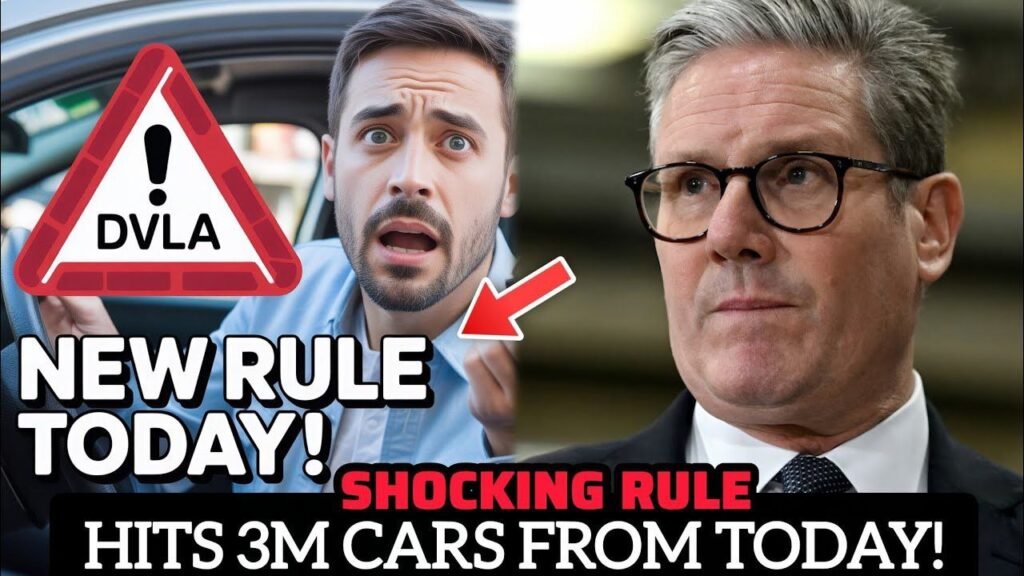Millions of drivers in the UK have woken up to fresh concerns as the Driver and Vehicle Licensing Agency (DVLA) brings in a brand-new enforcement rule starting today. The rule is designed to tackle untaxed, uninsured, and non-compliant vehicles, with 3 million cars across the country expected to be directly impacted.
While most motorists know about their MOT dates and road tax renewals, this new rule goes a step further—using digital tracking systems and stricter fines to ensure every vehicle on the road is both legal and environmentally compliant.
What Is Changing from Today?
The DVLA has confirmed that, effective immediately, it will be running automated checks on millions of vehicles to identify:
- Cars without valid tax (Vehicle Excise Duty – VED).
- Vehicles with expired MOT certification.
- Owners who have not updated their logbook (V5C) details after moving house.
- Cars that fail new emissions standards, especially within Clean Air Zones (CAZ).
This means if your car falls into any of these categories, you could face instant fines or enforcement action starting today.
Why 3 Million Cars Are at Risk
According to official estimates, around 3 million cars on UK roads currently have outdated DVLA records or missing compliance certificates. The most common reasons are:
- Forgetting to renew car tax.
- Not updating V5C logbook details after changing address.
- Letting MOT expire unknowingly.
- Driving older, high-pollution vehicles in restricted zones.
This “sweep” by the DVLA is aimed at cleaning up the vehicle database and encouraging greener and safer roads.
The Penalties Drivers Could Face
The costs of ignoring this update are steep:
- Up to £1,000 fine for not updating logbook details.
- Automatic £80 penalty (rising to £1,000) for untaxed vehicles.
- Insurance becomes invalid if you drive without a valid MOT.
- Clean Air Zone daily charges from £8 to £50 for non-compliant cars.
- Clamping, towing, or even scrapping vehicles if DVLA enforcement officers take action.
How Drivers Can Protect Themselves
The good news is drivers can avoid all of these penalties by taking just a few minutes to check their vehicle records.
- Check your MOT status: gov.uk/check-mot-status
- Check your tax status: gov.uk/check-vehicle-tax
- Update your logbook (V5C): Ensure your name, address, and car details are correct.
- Check CAZ compliance: Verify whether your car is allowed in Clean Air Zones without charges.
Why This Rule Is Being Enforced Now
The DVLA has been moving towards a fully digital compliance system for several years. With the UK government’s commitment to reducing emissions and preparing for the 2035 petrol and diesel car ban, this latest rule is a step towards:
- Cutting down on uninsured and untaxed cars.
- Reducing high-pollution vehicles in major cities.
- Improving road safety by ensuring MOT compliance.
By acting now, DVLA hopes to make driving in the UK safer, cleaner, and fairer.
Reaction from Drivers and Experts
Many UK drivers have taken to social media expressing frustration over the sudden enforcement, with some calling it a “cash grab.” Others argue that the rule is fair, as every motorist is responsible for keeping their vehicle legally compliant.
- RAC spokesperson: “Drivers must treat their vehicle records as a priority. Failure to update simple details like a change of address can result in expensive fines.”
- AA motoring expert: “This may seem harsh, but it ensures cars on UK roads are safe, taxed, and environmentally responsible.”
What It Means for the Future of UK Motoring
This enforcement is only the beginning. Over the coming years, drivers can expect:
- More cities introducing Clean Air Zones.
- Higher penalties for non-compliance.
- ANPR cameras monitoring tax, MOT, and insurance automatically.
- A complete phase-out of petrol and diesel vehicles by 2035.
For motorists, this means staying proactive about DVLA records will become even more critical.
Conclusion
With this new DVLA rule in force today, over 3 million UK cars are under the spotlight. Drivers who fail to keep their vehicle records updated face fines, invalid insurance, and the risk of losing their car altogether.
The solution is simple: check your MOT, update your logbook, and ensure your tax is paid. A few minutes online today can save you hundreds of pounds tomorrow.
Disclaimer
The details in this article are based on publicly available sources and government announcements at the time of writing. Rules, fines, and DVLA enforcement policies may change. Drivers should always verify the latest information on the official DVLA website or authorised UK government portals. This site does not accept responsibility for any penalties, losses, or changes resulting from reliance on the information provided here.
